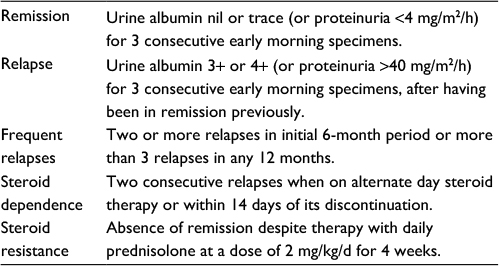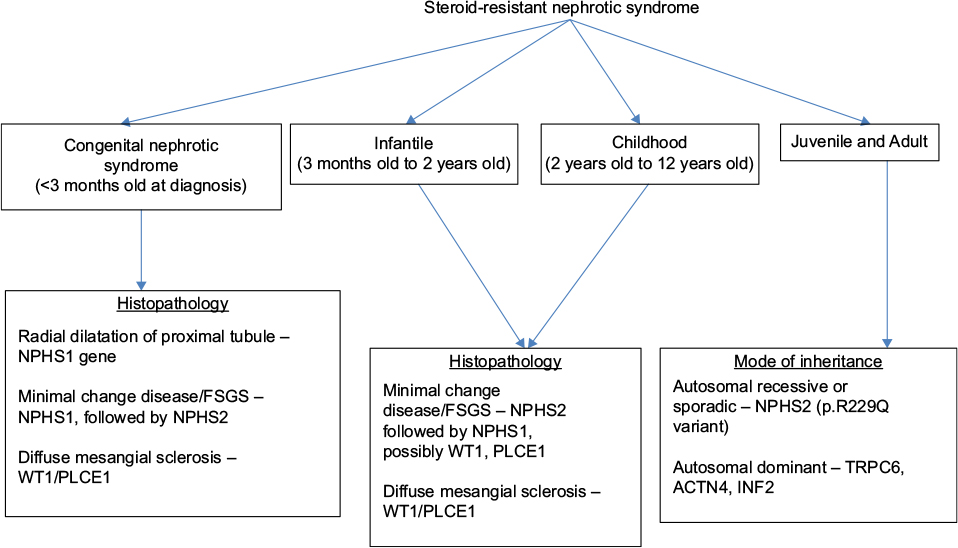Steroid-resistant nephrotic Syndrome (SRNS) does not respond to initial steroid therapy, often due to genetic variants affecting kidney function. Treatment options for SRNS include hemodialysis, peritoneal dialysis, and renal transplant, aiming to replace kidney function.
Managing SRNS in children is crucial for long-term outcomes and quality of life. Early diagnosis through genetic testing plays a significant role in personalized treatment approaches for SRNS patients. Understanding the genetic spectrum of SRNS is essential for optimizing management strategies and improving patient outcomes.
Individuals with SRNS require specialized care to address the underlying genetic factors contributing to the disease’s resistance to standard treatments. Taking a comprehensive approach to SRNS management can lead to a better prognosis and quality of life for affected individuals.

Credit: kidneyandtransplant.cochrane.org
Clinical And Genetic Spectrum
Steroid-resistant nephrotic Syndrome (SRNS) is a rare genetic disorder that affects the kidneys. It is characterized by the kidneys’ inability to filter blood effectively and remove waste products. The clinical and genetic spectrum of SRNS presents a myriad of variations and intricacies, making it a complex and challenging condition to diagnose and manage.
Exploring Clinical Variants
SRNS encompasses a diverse range of clinical variants, each with its unique presentation and challenges. The clinical spectrum of SRNS includes focal segmental glomerulosclerosis (FSGS), a subtype commonly associated with resistance to steroid treatment. Additionally, other variants, such as minimal change disease and membranous nephropathy, contribute to the complexity of SRNS, further underscoring the need for comprehensive diagnostic and therapeutic approaches.
Genetic Testing Importance
Genetic testing plays a pivotal role in unravelling the genetic underpinnings of SRNS, enabling the identification of specific gene mutations responsible for the condition. The significance of genetic testing in SRNS lies in its potential to facilitate personalized treatment strategies and predictive insights, thereby enhancing clinical management and patient outcomes.
Management Options
When it comes to managing Steroid-Resistant Nephrotic Syndrome (SRNS), various treatment options are available to help patients cope with this condition effectively.
Usual Treatments
- Typical management options for SRNS include hemodialysis, peritoneal dialysis, and renal transplant.
- These treatments aim to replace the kidney’s vital functions in the body when ESRD is imminent.
Treatment In Children
- Children with SRNS may require specialized care tailored to their specific needs.
- Management strategies in pediatric patients may involve a combination of medications, dietary modifications, and close monitoring.
Long-term Outlook
- The prognosis for individuals with nephrotic Syndrome varies based on the underlying cause and response to treatment.
- Many patients can lead an everyday life, especially if the condition goes into remission.
Life Expectancy And Quality Of Life
The life expectancy and quality of life for individuals with Steroid-Resistant Nephrotic Syndrome can vary depending on the severity of the disease and the individual’s response to treatment. While remission and everyday life are possible with treatment, some individuals may experience disease progression if they do not respond well to treatment.
In Nephrotic Syndrome
Nephrotic Syndrome can significantly impact the life expectancy and quality of life of individuals affected by the condition. While it is a severe condition, many people with nephrotic Syndrome respond well to treatment and are able to live essentially everyday lives, especially if the condition goes into remission. The response to treatment can vary, with some patients experiencing improvement within a few days while others may take several weeks or even months to respond.
In Fsgs
Focal segmental glomerulosclerosis (FSGS) is a type of nephrotic Syndrome that affects the filtering units in the kidneys. The life expectancy of individuals with FSGS can vary depending on the severity of the disease and how well they respond to treatment. Remission is possible with proper management, and many people with FSGS go on to live many years and enjoy a good quality of life. However, for those who do not respond well to treatment, the disease can progress and potentially lead to complications. In both nephrotic Syndrome and FSGS, the primary goal of treatment is to manage the symptoms, reduce proteinuria (excessive protein in the urine), and prevent further damage to the kidneys. Treatment plans typically include a combination of medications, dietary changes, and close monitoring by a healthcare team specializing in renal disorders. Individuals with steroid-resistant nephrotic Syndrome need to work closely with their healthcare providers to find the most effective treatment plan for their specific case. Regular follow-ups and adherence to the recommended treatment regimen are crucial in improving the long-term prognosis and quality of life for individuals with this condition. Overall, while steroid-resistant nephrotic Syndrome can pose challenges and potentially impact life expectancy and quality of life, with proper management and treatment, many individuals are able to lead fulfilling lives. Individuals with nephrotic Syndrome and their families need to seek support and education about the condition to understand better and navigate the challenges they may face.

Credit: www.dovepress.com
Epidemiology
Research And Development
Steroid-resistant nephrotic Syndrome (SRNS) is a challenging condition that requires ongoing research and development to improve treatment options and patient outcomes. Past studies have laid the foundation for our current understanding, while current insights have opened up new avenues for potential breakthroughs.
Past Studies
Over the years, numerous studies have been conducted to deepen our understanding of SRNS. These studies have identified various underlying factors, such as genetic mutations and hormonal imbalances, that contribute to the resistance of steroids in treating nephrotic Syndrome. The early research has also highlighted the importance of early diagnosis and timely intervention in managing SRNS.
One significant finding from past studies is the role of genetic testing in SRNS. Through advances in genetic testing technologies, researchers have been able to identify specific gene mutations associated with steroid resistance. This knowledge has paved the way for personalized treatment strategies, as clinicians can now tailor interventions based on a patient’s specific genetic profile.
Another critical area of focus in past studies has been renal biopsies. These biopsies provide valuable insights into the underlying pathology of SRNS, including the presence of focal segmental glomerulosclerosis (FSGS). Understanding the specific histological features of FSGS helps clinicians determine the most appropriate treatment approaches for individual patients.
Current Insights
The field of SRNS research is continuously evolving, with ongoing studies providing new insights into the condition. Current research is focused on exploring alternative treatment options for steroid-resistant patients and investigating the underlying mechanisms of steroid resistance.
One area of current interest is the use of novel immunosuppressive agents in the treatment of SRNS. Researchers are exploring the efficacy and safety of drugs such as rituximab and calcineurin inhibitors, which have shown promising results in some cases of steroid-resistant nephrotic Syndrome. These alternative therapies may offer a glimmer of hope for patients who have not responded to conventional treatments.
Additionally, advancements in genetic testing technologies, such as next-generation sequencing, have enabled researchers to identify new genetic mutations associated with SRNS. This ongoing genetic research aims to uncover the condition’s complex genetic architecture and its impact on treatment outcomes. By unravelling the genetic factors that contribute to steroid resistance, researchers hope to develop targeted therapies that can bypass the limitations of traditional steroid-based treatments.
In conclusion, research and development are crucial in the field of SRNS as they pave the way for improved diagnostic methods, personalized treatment approaches, and breakthrough interventions. Past studies have laid the foundation for our current knowledge, while current insights continue to push the boundaries of our understanding. With ongoing research, we can hope for more effective and tailored treatments for patients with SRNS.

Credit: www.dovepress.com
Genetic Understanding
Understanding the genetic component of steroid-resistant nephrotic Syndrome (SRNS) is essential in guiding diagnostics and developing targeted treatments. Genetic research has shed light on various single gene variants and hereditary characteristics that play a role in this condition.
Single Gene Variants
Research has identified several single gene variants associated with steroid-resistant nephrotic Syndrome, including genes encoding for proteins involved in the function and structure of the glomerular filtration barrier, such as NPHS1, NPHS2, and PLCE1. Understanding these variants is crucial for precise diagnostic testing and personalized treatment approaches.
Hereditary Characteristics
The hereditary characteristics of SRNS encompass a wide range of genetic mutations and inheritance patterns. Familial clustering and consanguinity have been observed in some cases, indicating a hereditary component to the condition. They also understand the genetic nuances of SRNS, which aids in counselling families about the potential risk of inheritance and the importance of genetic testing for at-risk individuals.
Clinical Overview
Steroid-resistant nephrotic Syndrome (SRNS) is a rare kidney disorder that primarily affects children. It is characterized by the kidneys’ failure to respond to steroid treatment commonly used for nephrotic Syndrome. SRNS leads to persistent proteinuria, low protein levels in the blood, high cholesterol, and edema. It can result from various genetic mutations affecting podocyte function. Early diagnosis and management are crucial in reducing long-term complications.
Characteristics Of Srns
The following characteristics often distinguish steroid-resistant nephrotic Syndrome:
- Failure to respond to steroid treatment
- Persistent proteinuria
- Low levels of protein in the blood
- High cholesterol levels
- Edema or swelling
Diagnostic Information
Diagnosing SRNS typically involves a comprehensive evaluation, including:
- Clinical history and physical examination
- Urinalysis to detect proteinuria
- Blood tests to assess protein levels and cholesterol
- Genetic testing to identify underlying mutations
- Renal biopsy to evaluate kidney tissue
Frequently Asked Questions
How Do You Treat Steroid-resistant Nephrotic Syndrome?
Usual management for steroid-resistant nephrotic Syndrome includes hemodialysis, peritoneal dialysis, and renal transplant to replace kidney function.
What Is The Life Expectancy Of A Person With Nephrotic Syndrome?
The life expectancy of a person with nephrotic Syndrome varies, but most respond well to treatment and can live essentially an everyday life, especially if the condition goes into remission. Patients may respond to treatment within a few days, or it may take several weeks or even months.
What Is The Life Expectancy Of Someone With Fsgs?
The life expectancy of someone with FSGS varies. With treatment, remission is possible, and many can live a long and good-quality life. If treatment is not adequate, the disease may progress.
How Common Is Steroid-resistant Nephrotic Syndrome?
Approximately one-third of cases of steroid-resistant nephrotic Syndrome are due to gene variants affecting podocyte structure and function.
Conclusion
Managing steroid-resistant nephrotic Syndrome involves treatments like hemodialysis, peritoneal dialysis, and renal transplant. Patients’ responses vary, with remission possible and significant impacts on life expectancy. Understanding the genetic aspects is crucial for personalized care. Stay informed to navigate this complex condition effectively.






